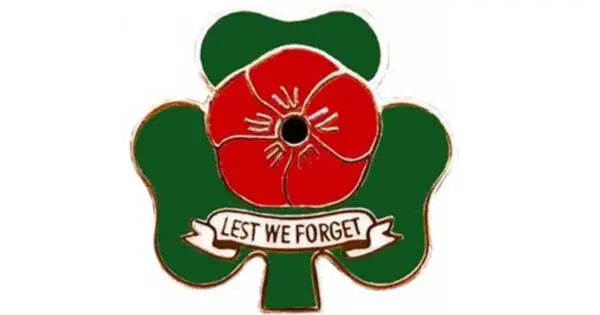An Irish politician has split opinion with his stance over Remembrance Shamrock Poppy Pins.
Fine Gael Senator Frank Feighan has urged Irish people to wear one of the pins, and has sent out 1,000 to members of his party to distribute to the public.

The First World War saw more than 200,000 Irish soldiers fight for the British Army.
However, these men are often overlooked by Irish history, because while the War was taking place, Ireland was fighting against Britain for their independence firstly in the Easter Rising, and then in the years that followed in the War of Independence and the Civil War.
The ill-feeling towards Britain at the time in Ireland, meant that many of these Irish soldiers were not given the recognition they deserved for their part in Britain’s War campaign.
Some in fact, were even considered to be disloyal for fighting for the British.
Feighan, of Boyle, Co Roscommon, told Ocean FM: “We have airbrushed these young men who died out of history.
“I think in more mature times the poppy no longer carries the connotations it once did.”
He pointed out that there were thousands of Irish soldiers that died in the War and they must not be forgotten.
The controversy came from the fact that Feighan used official Oireachtas postage to distribute the 1,000 poppies out across the country.
The poppy is worn in Britain as a symbol of remembrance for all British military that have died in battle, not just in the First and Second World Wars.
Given the Troubles in Northern Ireland, where British forces killed several civilians, most notably on Bloody Sunday, many Irish people refuse to wear the poppy.
The most high profile example is Premier League footballer James McClean.
He has refused to wear a poppy on his shirt during the month of November throughout his career, going against the norm for all players of all clubs.
He explained his stance in 2015 in the matchday programme for his then-club West Brom: “People say I am being disrespectful but don’t ask why I choose not to wear it.
“If the poppy was simply about World War One and Two victims alone, I’d wear it without a problem.
“I would wear it every day of the year if that was the thing but it doesn’t. It stands for all the conflicts that Britain has been involved in. Because of the history where I come from in Derry, I cannot wear something that represents that.”
More popular articles and videos
The real life mystery of what Maureen O’Hara whispered to make John Wayne look so shocked
Matt Damon winning hearts and minds with charm assault on Ireland
Action hero Tom Cruise was once attacked by an old man in a Kerry pub
Liam Neeson speaks about his late wife in emotional interview
Dating site explains why Irish men make wonderful husband material
Billy Connolly says public should ignore politicians and listen to comedians
Take a look inside Hollywood star Saoirse Ronan’s stunning Irish home
